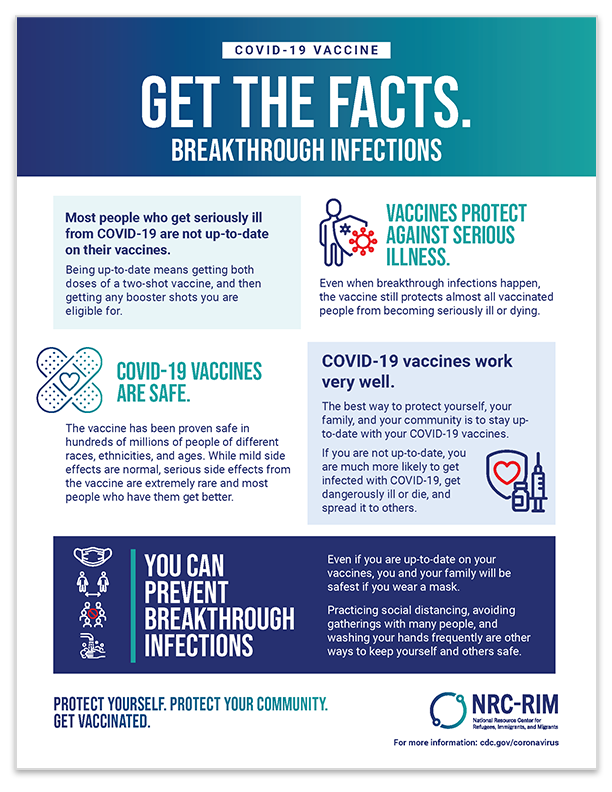
What is a breakthrough infection, and why do they happen?
When people get COVID-19 after they are vaccinated, scientists call it a “breakthrough infection.”
COVID-19 vaccines are effective at preventing serious illness, hospitalization, and death. Boosters offer even more protection. However, since vaccines are not 100% effective at preventing infection, some people who are up-to-date on their vaccines will still get COVID-19.
Do breakthrough infections mean vaccines don’t work?
COVID-19 vaccines work very well. Most people who get seriously ill from COVID-19 are not up-to-date on their vaccines. Even when breakthrough infections happen, the vaccine still protects almost all vaccinated people from becoming seriously ill or dying.
It seems like a lot of people are getting breakthrough infections. Why is that?
Vaccines were developed for one version of the virus, but new variants have emerged that are slightly different so more people are getting sick. Regardless of the variant, COVID-19 vaccines are effective at preventing serious illness and death.
Is it worth the risk to get the vaccine if I can still get a breakthrough infection?
The risk of the vaccine is much, much lower than the risk of getting sick from COVID-19. If you are up-to-date on your COVID-19 vaccines you are less likely to get infected with COVID-19, be hospitalized, or get dangerously ill or die. You also are much less likely to spread it to loved ones.
The vaccine has been proven safe in hundreds of millions of people of different races, ethnicities, and ages. It is much more likely that you will get serious complications from COVID-19 than from a vaccine. While mild side effects are normal, serious side effects from the vaccine are extremely rare and most people who have them get better.
How can I protect myself and my family while people keep getting sick?
The best way to protect yourself, your family, and your community is to stay up-to-date with your COVID-19 vaccines by getting fully vaccinated and then getting a booster when you’re eligible. If you are not up-to-date, you are more likely to get infected, get dangerously ill or die, and spread the virus to others - including your family and friends.
Regardless of whether masks are required in your area, you and your family will be safest if you wear a mask. Even if you are up-to-date on your vaccines, you can catch COVID-19 and may not know it because you may not feel sick at all. This makes it more likely that you could spread it to others. Masks also protect you from COVID-19 because when you wear a mask, it is less likely that you will get sick from breathing in the virus if it is in the air.
Practicing social distancing, avoiding gatherings with many people, staying home when you are sick and washing your hands frequently are other ways to keep yourself and others safe.
I’m hearing of people who are dying from COVID-19 even though they are fully vaccinated. Why should we get vaccinated if people are still dying?
COVID-19 vaccines are effective at preventing serious illness, hospitalization and death. Most people who get COVID-19 are not up-to-date on their vaccines. Even when breakthrough infections happen, the vaccine still protects almost all vaccinated people from becoming seriously ill or dying.
In very rare cases, people with serious medical issues, who are older, or who have a medical condition that causes their immune system to have more difficulty fighting off infections and diseases (called immunocompromised), can get dangerously ill from COVID-19 and even die even if they are up-to-date on their vaccines. This is one of the reasons people are getting booster shots or third doses.
It’s important to remember that if you are not vaccinated, you are:
- 2.4 times more likely to get infected and
- 9 times more likely to die from COVID-19, as compared to someone who is fully vaccinated.*
Staying up-to-date with your COVID-19 vaccines, including getting a booster when you are eligible, is the best way to protect yourself, your family and your community from getting dangerously ill from COVID-19.
If you are worried, you can talk to your doctor about your concerns and they can speak to you about your specific risks.
* Data is from Feb. 2022 (source )
